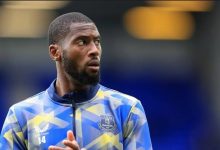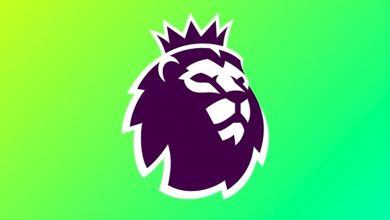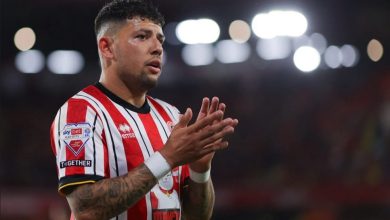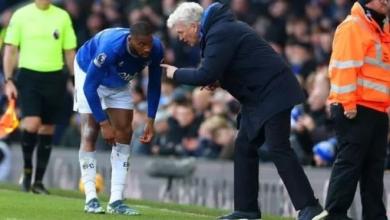It was an explosive end to a historic match, the last Merseyside derby at Goodison Park settled with a 98th minute James Tarkowski equaliser.
In the bedlam that followed the final whistle, Everton midfielder Abdoulaye Doucoure celebrated in front of the Liverpool fans, prompting a clash with opposite number Curtis Jones that saw both players sent off. But that on-field rancour, depressingly, was only the start of it.
When Doucoure went back to the dressing room, he noticed his Instagram account had “lit up”. There were, by his estimate, “thousands” of direct messages spewing the worst, most vile sort of racism. And they just kept coming for days.
There was crude text abuse but also a string of gifs and emojis of monkeys and bananas. Even worse, there were death threats to him and his young family. Doucoure decided that he had to take a stand.
“I never used to speak on racism,” he says. “I just tried to cope and ignore it but sometimes you need to speak on these topics and spread the message.
“I understand the frustration about the celebration I had in front of the Liverpool fans, and I accept that they can criticise and say that wasn’t appropriate, but I’m surprised people use discrimination to hurt you. I received death threats, as well as my family, which is going too far.
“We know this happens every weekend for a lot of players and [now] I want to be an example on how to stand against this and send a strong message to people.”

A senior Premier League figure said it was “some of the worst outpourings of abuse” they had ever seen. Particularly shocking was that when both clubs issued a joint statement condemning the abuse the next day it “sparked it all off again”.
“I think that just shows the mentality of the sort of people we’re dealing with,” Tim Cooper, the Premier League’s director of content protection, tells The i Paper.
He describes the Doucoure incident as a “drop everything” moment for the league’s 10-person online abuse team, dubbed the troll-hunting unit, which is made up of lawyers and experienced investigators who monitor every top flight match looking for “triggering incidents” such as contentious goals, VAR decisions or even celebrations.
It is their job to get the worst abuse taken off social media platforms as soon as possible – and also identify and help punish the worst offenders by collecting evidence and digging into the usually anonymous accounts that send it. Cooper admits they had their work cut out for them in the Doucoure case.
“Watching that match you sort of thought ‘Something’s happened here’ and it did happen very quickly,” he says.
“It was horrendous in Abdoulaye’s case. The volume of messages was extraordinary. They were all open messages, so he will have just seen his account ‘light up’, and the abuse was really different this time.
“It used to be text-based, but Instagram is very emoji-based. It was awash with monkey and gorilla gifs and it’s the first time we’ve really seen that, and it’s really difficult to filter that out. We can look for text or emojis but it’s much more difficult with video.
“It was spiteful and obvious what was going on, so we were already working to remove posts straight away after it happened, and then we were straight into the player to offer support.”
Cooper confirms that multiple investigations are ongoing in Doucoure’s case, both in the UK and overseas, where, the league’s figures suggest, a staggering 85-90 per cent of the abuse comes from.
Thanks to the cooperation of the player and the diligent work of Cooper’s team and the police, they are hopeful they will be able to “progress” many of those investigations to something more tangible.
“It can be incredibly complex and difficult but the Premier League is determined to fight the good fight on this,” he says. “This is a full-time job for us.”
To mark the league’s “No Room for Racism” fortnight, The i Paper has been granted unique insight into Cooper’s team, which is the only unit of its kind working in football.
Set up in 2019 after a “noticeable uptick” in social media abuse towards Premier League players, they work closely with X and Meta to take down posts that cross a criminal threshold.
“This is not about saying ‘Player X should have scored that’ or ‘He’s rubbish,’” Cooper says. “It’s the most egregious types of abuse we’re determined to take action against.”
It can be frustrating, with rules in different countries making it fiendishly complicated to take action at times. Both Doucoure and Cooper believe the platforms should do more work around verifying accounts, with the former calling for “stricter rules” around allowing anonymous posters on their platforms.
But this is about being proactive about abuse rather than reacting after the event.
The numbers are stark: they have investigated more than 3,000 cases of online discriminatory abuse in the last six years, sent to players, their families and club officials. This is not mild criticism – some of the worst includes images of guns or knives and threats sent to partners and children of players and officials.

But they have had some high-profile success, with convictions in the UK and Singapore for trolls who were unmasked as abusing Premier League strikers Ivan Toney and Neal Maupay in the last three years.
All the data they collect is sent to the social media platforms and the Government, who are working on an updated online safety bill. Tools that the Premier League have helped pioneer have also reduced the number of messages going directly to players and officials from 50 to 100 a week to barely double figures over the entire season.
Education is also key, with Doucoure one of the leading faces of new anti-racism educational material going out to schools this week as part of their “Primary Stars” programme. He has also visited local classrooms to talk about discrimination, embracing his unwanted but essential role in a never-ending fight.
“Footballers are role models and idols for young people so when they speak on these topics, the message is stronger,” Doucoure says.
“Players should recognise the responsibility they have to positively influence the young generation.”








